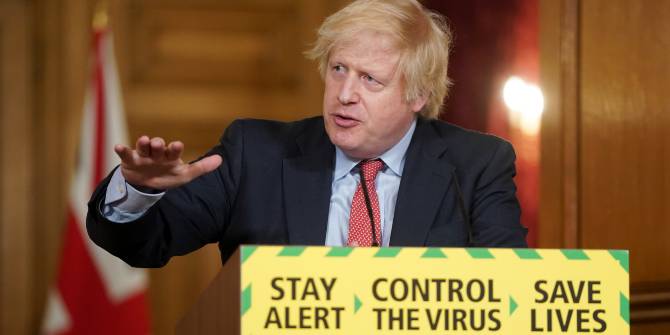What can the experience of the COVID-19 pandemic teach us about Britain’s approach to Brexit? Joelle Grogan (Middlesex University) says state policies based on legal certainty, transparency, clear communication, and urgent (re)action have strongly correlated with the most positive outcomes – but these have not been greatly in evidence in the UK.
Amidst a global pandemic, the latest rounds of Brexit negotiations on a Future UK-EU Relationship Agreement have had little attention and less scrutiny. There are far more pressing and immediate concerns in tackling a global health emergency which (at the time of writing) counts over 7 million confirmed cases worldwide. In the face of an immediate emergency, there seems little political will or attention to be given to a fraught issue which has already consumed billions of pounds, and years of attention.

The difficulty of legal commentary on this phase of the negotiations is that it appears little has changed, and less has been agreed. British texts outlining proposals for the UK’s future relationship with the EU published in advance of the June negotiating round found little support from the EU side, labelled ‘cherry picking’ for arguably going beyond a typical Free Trade Agreement, though calling it one. Following the negotiation, Michel Barnier characterised the UK as ‘backtracking’ on what was agreed within the Political Declaration.
We appear to be no closer to the conclusion of an agreement, and yet no more certain of the likelihood of a ‘no deal’ Brexit than at any stage leading up to the conclusion of the Withdrawal Agreement. Past experience is no useful guide in conjecturing the future progress of negotiations. While the Withdrawal Agreement had ultimately required three extensions under Article 50 TEU, and nearly ten months beyond its initial allotted period of two years, only one of those extensions had been under Boris Johnson’s premiership and before his success in the December 2019 elections.
Despite this political uncertainty, there are some legal realities upon which there can be certainty. First, the UK is no longer an EU Member State – it has ‘Brexit-ed’. Second, we are approaching half-way through the transition period which is due to end on 31 December 2020. During this transition period, the UK and the EU are expected to negotiate, conclude and ratify the Agreement on their future relationship. Any agreement must be ratified by the UK Parliament, the European Parliament, and a qualified majority of the European Council. It is also possible that where a matter covers an area of national competence, ratification by national parliaments could be required. Allowing a comparably short time for scrutiny and approval, it is currently expected that an agreement must be reached before the October European Council meeting. This leaves three months for the conclusion of a draft agreement.
Any Agreement on the Future UK-EU Relationship is likely to be (or should be considering its forecast depth, scope and ongoing impact) the most complex agreement to be negotiated in contemporary UK history, and in a fraction of the time normally accorded to complex international agreements. The headline issues of fisheries, tariffs and a ‘level playing field’ (relating to highly complex questions of regulatory divergence and mutual recognition of standards), belie the far more complex legal issues related to a myriad of interrelated areas including for example data transfer, energy, transport, and cooperation on judicial, criminal and security matters; as well as essential and ongoing concerns related to governance, supervision, interpretation and dispute settlement under any Agreement. While separate draft texts have been produced by the EU (in March) and UK (in May), no joint draft text has yet been produced, and key issues appear to be intractable. In an otherwise ordinary time, a year to negotiate was ambitious at best; and these are no ordinary times.
The necessity of responding to the coronavirus epidemic has provided a reasonable ground for an extension to the transition period to allow further time for negotiation. Under Art 132 of the Withdrawal Agreement, there is scope for an extension of up to one or two years. Such an extension must be agreed by a decision of the UK-EU joint committee, on both the length and terms of the extension. Within UK domestic law, the amended EU (Withdrawal) Act 2018 prohibits any UK minister agreeing to an extension, and so an Act of Parliament would need to be passed to repeal this prohibition – and before 1 July 2020. The devolved governments of Northern Ireland, Scotland, and Wales have all urged for an extension to the transition period. However, Boris Johnson has reiterated his commitment not to extend beyond the current 31 December 2020 deadline. With mere weeks left, an extension seems legally possible, but not politically probable.
In the almost inevitable global recession facing the UK and EU in the years ahead, a key point of distinction will not be in how severe the damage is, but in the speed of recovery. While national responses have characterised action taken to the COVID-19 crisis worldwide, it is likely that international cooperation on trade, research and mobility will be determinative of the speed of recovery. In the EU, while previously having a limited role in tackling the coronavirus, the European Commission announced a Recovery Plan in late May 2020 which proposes extensive funding and investment to promote economic and social recovery within the Union. There is some controversy, however, where rule of law conditionality may stop some states from approving the budget, and otherwise be unsupportive of controlled spending by the EU institutions, rather than Member States’ own governments.
In terms of the UK, it has been the worst affected by the coronavirus in Europe, and is among the countries with the highest mortality rates in the world. Still under restrictive measures, the full depth of the economic and social damage has yet to be fully estimated. Outside of the scope of the EU’s Recovery Plan, and potentially without an Agreement with the EU Member States on the movement of goods, people, capital and services between Great Britain and the EU (as Northern Ireland will fall under the terms of the Withdrawal Agreement), the UK will need to quickly replace or replicate not only disrupted supply chains and investment, but also manage the severe uncertainties that a ‘No Deal’ scenario would bring.
What conclusions, then, can be drawn from the current state of play and emergency? As I’ve argued elsewhere in the context of COVID-19, it has become globally apparent that state policies based on legal certainty, transparency, clear communication, and urgent (re)action have strongly correlated with the most positive outcomes. This guide for best practice is as applicable to the Brexit process, as it is in legal measures taken in response to COVID-19. Unfortunately, sitting mere months before the next ‘No Deal’ deadline, these principles do not seem to be universal.
This post represents the views of the author and not those of the Brexit blog, nor LSE. It first appeared at DCU Brexit Institute.







Since the UK has published its stance, and the talks have appeared to have stalled somewhat, there is nothing for the UK parliament to scrutinise.
The UK’s default position (established after the Referendum result) is that all agreements be simply rolled over whilst observing the UK’s new-found status as a sovereign nation. This position led to Liam Fox’s often-misquoted comment about this being ‘the easiest deal in history unless the politics gets in the way’.
He has so far been proved right, given that the two-year negotiation period was extended TWICE due to the EU’s intransigence.
No matter how complex the current agreements are on data transfer etc, they can be continued by two signatures on a form.
The talk about a level playing field is all smoke and mirrors. The EU and the UK use the same UNECE standards, a fact that is studiously ignored by those who advocated remaining in the EU.
The coronahoax non-event has been blown out of all proportion, and should not (and hasn’t) impacted negatively on the talks. Supply chains have been unaffected, largely people producers want to sell goods and consumers want to buy them. We were told by ‘experts’ how disruptive first a Leave vote would be, and then actual Brexit, but the UK was flourishing right up to lockdown.
The devolved parliaments should not have a say in the current talks. The UK joined the EEC and EU en masse, and it left it in the same way. The UK government rules the entire nation, and tinpot nobodies like Sturgeon and Blakeford should accept that fact.
The UK is a sovereign nation, which means it can now control its waters. The EU cannot grasp this simple concept.
Dear Gary,
Perhaps it would be very good for you toenjoy reading James Leslie Brierly’s “International Law”: there you would find that «all international agreements cannot be simply rolled over» because they are in fact “international agreements”…
About your precious UKGBNI long-last recovered sovereignty through that lovely triad Johnson/Gove/Cummings, I would highly recommend you the following quote from Zbigniew Brzezinski: «Sovereignty is a word that is used often but it has really no specific meaning. Sovereignty today is nominal. Any number of countries that are sovereign are sovereign only nominally and relatively.»
Brexit? Man up and own it!
Yours,
Fernando
Dear Gary,
I thought that Brexiteers like you were fiercely adept at doing diligent and honest public finance accounting, at least on the broadsides of campaigning red buses…
Perhaps I was wrong because that’s to much to expect from newly sovereign Brits. But in any case, should you want to spend an extended Summer holiday at the Algarve (clean and safe from CoViD-19), please feel free to use your rediscovered bluish UK passport: there will be no controls at the EU borders until next December 31…
Yours truly,
Fernando
Gary has not bothered to answer. Perhaps just as well. How can one reply to such strange reasoning? Sovereignty means nothing, but international law everything? Who is the arbiter to determine this? Who selects the arbiter? One might as well say that individual humans have no rights as sovereign individuals, but…. who is to determine this? An unknown god? Certainly, no human individual would have the sovereignty to determine anything if we follow this kind of unreason.
International law only means anything if it is agreed and underwritten by sovereign entities which are able to somehow enforce international law. Read it back and take note of the word international law. Inter national law- law agreed between sovereign nations. There is no law but that agreed by sovereigns. That means sovereign individual human beings organised as sovereign nation-states, in the western democracies at least, not self-appointed kings, gods or jumped-up dictators organising as a temporary dictatorship. As an aside, one may note that international law is not necessarily unchanging, set in stone and always abided by by every signatory for ever and ever. Note also that there are signatories and, lo, sovereign nations who are not signatories. What does that signify, Fernando? International law means nothing without sovereign signatories who can enforce the law. As it is, much of such law, as any law, is unable to be enforced by anyone, except where and to the degree the sovereign nations with the wherewithal of the moment to enforce it do enforce it.
What did the West do when China invaded Tibet? What is the West doing about gross violations of human rights anywhere? Zilch, Fernando. Best to study the history of humanity, people, peoples, nations, coagulations, states, etc., some more.
“Gary has not bothered to answer. Perhaps just as well. How can one reply to such strange reasoning?”
You answered your own question.
It was impossible to reply to the earlier post.
Dear Jacob,
Perhaps instead of reading and lecturing about all these subjects (i.e. «[…] the history of humanity, people, peoples, nations, coagulations, states, etc., […]»), you should just focus on Jean Bodin’s book “On sovereignty”: it’s a really unique therapy for those who still think that current nasty affairs that afflict Humanity do indeed stop at political borders…
And if you have qualms about the hard living that ethnic minorities are enduring under the diktat of Xi Jinping’s People’s Republic of China, try not to buy chinese goods; for instance, Apple i-phones…
I wish you a nice North Sea weekend!!
Yours truly,
Fernando
The Law, by Frederic Bastiat, is also a good read, though somewhat dated.
Thanks for your wishes. I hope to be able to enjoy a weekend near the North Sea soon, and quite a few more if possible. Your rantings, for that is what they are, Fernando, are indeed unanswerable due to your immunity to opposing perspectives. Nothing to worry about. It happens to the best of people, in the best of families. Pointing to a book is generally unhelpful if the points made by your chosen opponents are not taken up. Democracy in the western, European context is probably the least worst form of self-government for Europeans. I realise that many Europeans differ on its definition or how it should be practiced. Also, many Europeans would rather have some kind of dictatorship. Somehow, things will keep happening.
Regretfully, I must conclude, on the basis of our exchange sofar, that this my reply will be entirely unsatisfactory to you in a positive sense. However, do not despair. Best wishes.